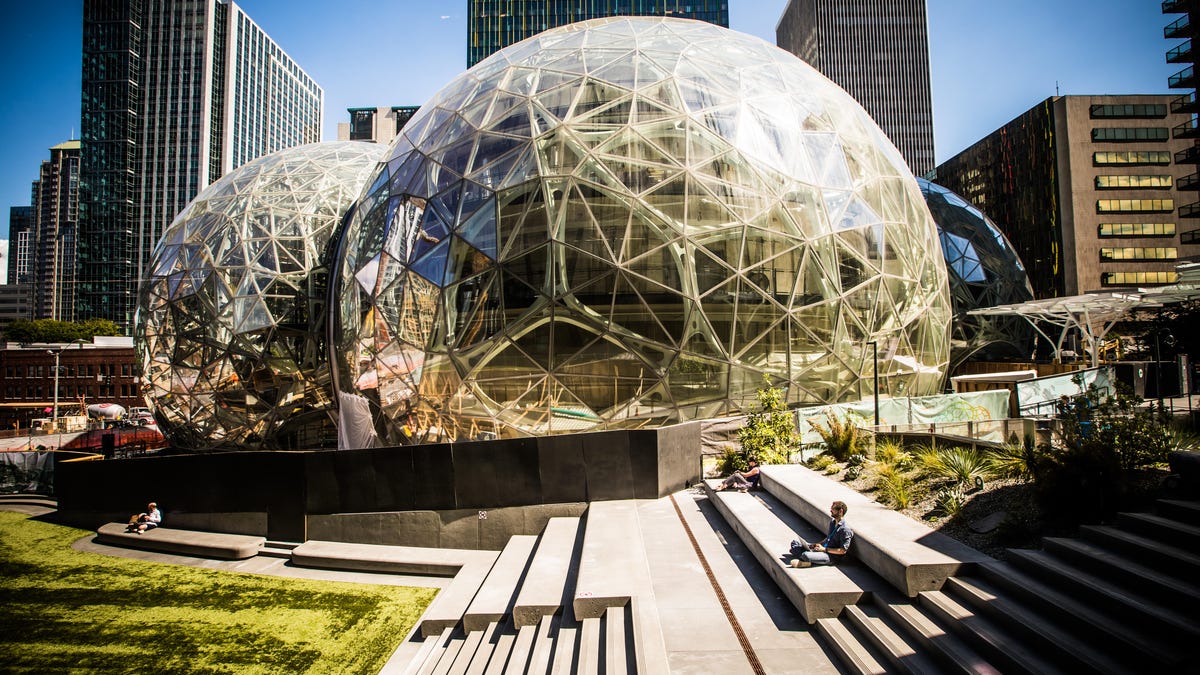Amazon sales surge but Bezos says coronavirus costs could hit $4 billion
The company's finance chief said he doesn't know when faster shipping times will be coming back.

Amazon's headquarters in Seattle in 2017. Stay-at-home orders have kept employees off the campus.
Amazon has been under the microscope for both its ability to deliver goods to its customers and the treatment of its warehouse workers. As part of its first-quarter results, the online retail giant addressed both concerns, with CEO and founder Jeff Bezos saying he plans to spend billions of dollars in the coming quarter as part of its coronavirus response.
"If you're a shareowner in Amazon, you may want to take a seat, because we're not thinking small," he wrote Thursday. "Under normal circumstances, in this coming Q2, we'd expect to make some $4 billion or more in operating profit. But these aren't normal circumstances. Instead, we expect to spend the entirety of that $4 billion, and perhaps a bit more, on COVID-related expenses."
That spending includes higher wages for workers and more safety gear like face masks. Also, Amazon's internal development of COVID-19 testing capabilities will cost $300 million in the second quarter and could cost $1 billion for 2020. The $4 billion in spending is a huge jump from the $600 million Amazon already spent in the first quarter on coronavirus-related costs.
All those costs could drive Amazon to report an operating loss in the second quarter, the company said Thursday.
While Amazon's stock hit an all-time high this month, shares tumbled 4% after the market's close following Bezos' warning, despite a better-than-predicted rise in revenue.
Coronavirus updates
Amazon has faced unprecedented challenges during the pandemic, with the retailer struggling to respond to a sustained surge in orders from millions of customers under mandates to stay home. Amazon said Thursday that demand still remains high. That surge has forced a slowdown in deliveries and caused popular items like toilet paper to go out of stock. At the same time, many of the company's employees have been protesting for more sanitary working conditions as dozens of US warehouses have reported coronavirus cases.
In the latest worker demonstrations, a group of employees in the US and Europe on Thursday morning announced the creation of Amazon Workers International to petition for higher pay and better job security. Also, on Friday, workers from Amazon, Target, Instacart and Walmart are planning a broad protest against working conditions during the pandemic.
Still, Amazon is in an enviable financial position during the crisis. Its main e-commerce business is taking in more orders than it can quickly handle, its online grocery operation and Prime Video service are seeing a spike in demand, and the Amazon Web Services arm is handling increased demand for streaming services like Netflix and for work-from-home operations. Many of its competitors have been forced to close their retail stores, and customers have become even more dependent on Amazon shipments -- signs that the company may come out of the health emergency stronger than before.
Juozas Kaziukenas, founder of e-commerce research site Marketplace Pulse, called Amazon's online sales growth "pretty staggering" and expects that growth to be even more impressive in the second quarter. He said he now expects Amazon is working to bring back its two-day and one-day shipping capabilities as quickly as possible so it can "completely obliterate the competition."
Amazon finance chief Brian Olsavsky told analysts on a call Thursday that he doesn't know when the company will be able to provide those faster shipments though he added that it's working to resolve the issue.
"It's taking longer to get things into our warehouse and out of our warehouse," he said about what's causing delays. Once that problem is resolved, "we'll see a resumption of more one-day service but right now things are still so up in the air that I can't really project when that day will be, at what point in Q2 or Q3 or beyond."
Revenue and spending
As far as the rest of Amazon's earnings report, revenue jumped 26% to $75.5 billion in the first quarter, well ahead of Wall Street expectations, thanks to that surge in customer orders. It was Amazon's largest percentage gain in six quarters. Profit dropped to $2.5 billion, from $3.6 billion a year earlier, and badly missed expectations. Earnings were already predicted to drop due to heavy spending that had been announced prior to Bezos' statements Thursday.
Those expenses included paying $700 million more in higher hourly wages and $800 million for new safety measures like additional janitors and over 100 million face masks for warehouse staff. Amazon also already hired 175,000 new employees to help it manage the rise in orders.
In a sign of Amazon's strength, Wall Street had pushed the company's stock higher during this crisis, even as consumer spending overall has plummeted, tens of millions of people are unemployed and large chunks of the economy like travel and airlines are essentially frozen. Amazon has some company at the top, with tech heavyweights Microsoft, Facebook and Apple all seeing their stocks rebound, as they're expected to capture more customers and market share following the crisis.
This dynamic of the biggest companies getting even bigger and more powerful following the pandemic could add to antitrust concerns about these tech giants -- an issue that had been percolating for the past year before the virus hit.
But for now, there's been little interest in reviewing whether Amazon is a monopoly as lawmakers and regulators are in crisis mode and consumers just want to make sure they can get their food and toilet paper delivered.

